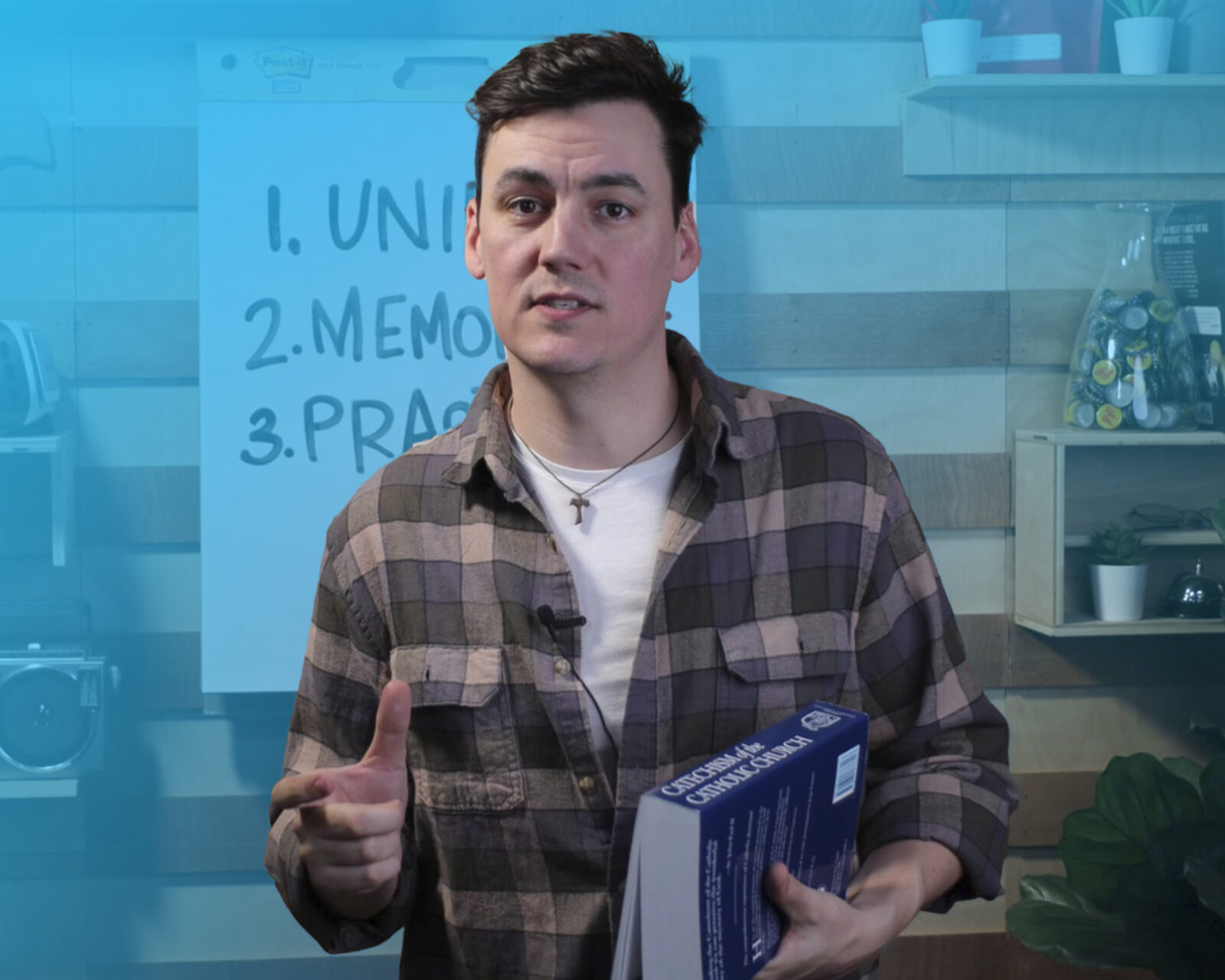Proclamation
What’s in a name?

Edmund shares about being cast as an astronaut for a day and the power of the Creed. Emily shares a story of persecuted Christians professing the Creed in the face of opposition.
[00:12] Introduction + Overview of Episode
Your Real + True hosts Edmund and Emily introduce themselves and this Unit 5 podcast. This Unit covers CCC 185-231 and the thesis of the episode is: “I believe in God.” The Unit includes three videos: Proclamation: What’s in a name? Explanation: “Who is God?” Connection: “What is the Creed? And why is it important?” In this Unit of videos, you’re invited to consider, “God is a person; how do we relate to God?” The hosts mention the Rock family, who is interviewed for one of the videos for this unit.
[06:40] Proclamation Video: The Implications of Knowing God’s Name
Emily challenges listeners, “We talk about ‘God’ but do we really stop and think about what that means?” God has revealed himself to us. The burning bush scene from scripture is discussed. It was a particularly fun scene to write and animate for the team; they enjoyed bringing it to life. The power of knowing someone’s name is addressed. Emily asks, “Do you know what Jesus’ name means?” Jesus’ identity is his mission.
[9:35] Favorite Part of the Episode: Standout Catechism Paragraph
Edmund and Emily share what paragraphs stood out to them. Edmund was moved by paragraph CCC 229: “Faith in God leads us to turn to him alone as our first origin and our ultimate goal, and neither to prefer anything to him nor to substitute anything for him.” This challenged Edmund to think, “Do I prefer God over everything else?” Emily was most struck by CCC 222-227. This section discusses the great consequences of believing in God, namely, it means coming to know God’s greatness and majesty, living in thanksgiving, knowing the unity and true dignity of all men, making good use of created things, and trusting God in every circumstance. Emily attests to the fact that her trust in God increased while working on this project through encountering this section.
[15:05] Explanation Video: The concepts that inspired this video are addressed.
Edmund talks about the first time he encountered the concept of God. Emily explains that faith is the belief in a “who” not a “what.” God wants us to know him as a person, not as a distant concept. The statement, “I believe in God” changes everything about our lives.
[20:17] Connection Video: “I believe in God.”
Perhaps this is the part of the Mass that is most memorized. Edmund shares his experience of being an astronaut for a day. Edmund explains that the Creed unifies the faithful, and is a powerful statement of belief in God. Emily mentions a powerful story of Christians who professed the Creed together in the face of persecution. The hosts pose the question, “Does the Creed really change our lives?”
[27:05] Announcement: Real + Verdadero has launched!
Real + True is a global project, releasing videos in English, Spanish, Portuguese, and French. New this week, this Real + True podcast is now available in Spanish. The goal is that all people would encounter the heart of the Catechism: Jesus Christ.
[28:08] Recap + Mission: The Catechism is a faithful echo of a God who desires to reveal himself to us.
Real + True transforms the Catechism into a living voice for the modern world. Connect with Real + True through the Real + True newsletter, facebook, instagram, twitter, LinkedIn, realtrue.org, and this podcast. Share with a friend.
Proclamation

Explanation

Connection

Edmund: Hi, everyone. And welcome back to the Real + True podcast. I’m your co-host Edmund Mitchell
Emily: And I’m your co-host Emily Mentock.
Edmund: And this podcast is for us to discuss the unit of video in more detail, to dive deeper into the content and share a bit of the behind the scenes of the mission and vision of Real + True. How are you doing, Emily?
Emily: I’m doing great, Edmund. And if you’re joining us today, we’re so excited for you to be here. And it means that Unit Five has launched, the Unit Five Proclamation, Explanation and Connection videos are out. So if you haven’t had a chance to watch those yet, I would definitely encourage you to do so. We’ll be sharing, you know, behind the scenes and insights from each of those videos on this podcast episode.
So you can go watch them now at realtrue.org or find us realplustrue on YouTube, Facebook, Instagram, all the social media sites.
Edmund: So give us an overview of this month’s content. This unit, Unit Five covers Catechism 185 to 231, but give us kind of an overview of all the content.
Emily: Yeah. So this section of the Catechism the thesis for is “I believe in God” and it’s really drawing us into saying, when we say we have belief in God, you know, “what does that mean?” “Who are we talking about?” “What does that relationship look like?” And so we’ve broken that down into, you know, our ecclesial method, inspired style of releasing these videos. The Proclamation video is all about, “What’s in a name?” ” What does knowing someone’s name mean?” ” What do you learn about that person? “How does it strengthen your relationship to know someone’s name?” Because of course we know God’s name and that is the basis of our relationship with him. And then the next video goes into then, well, “Whois God?” So we know God’s name. We have a relationship with him. “Who is that person behind the relationship?”
That’s a concept I really loved exploring this unit. And then the last video, the Connection video is all about, “What is the Creed?” And “Why is it important?” So the Catechism follows the structure of the Creed for this sort of pillar. And so we talk about, you know, “What is that? “Why is it so important to being a Catholic?”
So we’re really excited to talk about those three videos on this podcast today.
Edmund: This section of the Catechism, just to give context again, we’re in the first pillar of the four pillars on Creed. And we’re starting to break down the actual lines of the Creed. The articles of the Creed is what they’re called and it starts with, “I believe in God,” right? “I believe in God, the Father almighty creator of heaven and earth.”
Emily you mentioned when we were talking about this unit in particular, you mentioned that our target audience might be familiar with the term God or maybe raised Catholic or Christian, but we don’t often pause to think, “what do we mean when we say God?” We’ve heard, maybe a lot of us have heard the word “God” or the term “God” so much growing up, but do we all mean the same thing when we use that word?
Emily: Yeah, definitely. I think, yeah. I mean, of course we’ve heard “God.” We have a familiarity with the word. But even if you, like, let’s say, and I would imagine that many people in our target audience, they even still pray to God, you know, on occasion, whatever that works for their life.
I’m always especially praying on airplanes when they’re taking off or things like that. So especially before I had my conversion, I would still pray sometimes. And so what we really want to invite people to do in this unit is stop and think, okay, if God’s a person who I have a relationship with, if I’m hearing the Catechism, the teaching of our faith, say that well, then, I’m talking to God and about God all the time, “who is that person behind the name?”
And I just thought that was a really beautiful, like sort of entry point into then explaining, you know, who God is by first meeting people where they are and saying, “You talk about God and to God. Let’s stop and think about who that is”.
Edmund: Yeah. So for this proclamation video, we just tackle that head on. We’re like “What’s in a name? What is it about names?”The things we bring to the meaning of names, especially relationships and names. And we have this awesome couple, Yvette and Joshua, who have amazing kids’ names, like very uncommon kids’ names.
Emily: So original with their naming for their five children. And we, you know, the video actually, I was able to highlight one, their oldest daughter, her name is Arise and the story behind her name, which we were so great to have that have them share that with us, but they had a few other interesting ones too.
Edmund: Cedar. Chosen. There’s a lot of really interesting ones.
Emily: And I love how Yvette and Joshua were just like, so head on there. They’re just like, okay, there’s, there’s a reverence for names. Like there’s that heavier meaning of, you know, God calls us by name. God knows us before, you know, before we’re even born. And so they’re like, okay, for them and their belief, they said they can’t name their next son Bob after they’ve named all these other kids.
Edmund: They really prayed through it.
Emily: No offense to all the Bobs.
Edmund: Bob’s a great name, but like next to a Cedar, Chosen, Arise, it’s kind of like, well, what happened?
Emily: Well, and for them, I think it’s like, okay, the meaning of those words and those names that Bob, isn’t a name that had a lot of meaning to them. Of course. But of course there’s a lot of Bobs where their name does have meaning.
Do you, do you know the meaning of your name?
Edmund: Yes, my name means “prosperous protector.” Cause they have those little name cards at like the gas stations that have like everyone’s names and what it means. And I remember I had one that had like an eagle on it and it said “prosperous protector.” I don’t know. I’m a rich protector, I guess a rich cop.
Emily: There you go. I love that. I don’t know actually what “Emily” means, but my middle name is Mae and that was named after my grandmother, my dad’s mom. And she was also my godmother. And so I don’t know the root of the word “Emily” and where the original meaning comes from.
But my middle name carries a lot of meaning because of like the person that I was named after.
Yeah. Something
Edmund: that didn’t make it into the video, but that I realized as I was interviewing Yvette and Josh was that, you know, it says in Scripture, like God says, ‘I will call you by name.’ And I didn’t think, I didn’t realize, you know, it’s the ordinary things that sometimes we don’t take time to really think about.
I didn’t realize like, man, when I name my son or my daughter, I’m giving them the name that God is going to use to call them. That’s a big deal to be making in a way for all eternity, like God has to say “Ignatius” Right? Like, like it’s a very, it’s a very powerful thing, you know?
Emily: Yeah. It’s really beautiful. The other side is that we also call God by the name that he revealed. We say, “God”, but do we stop and think about what that means? And in this video, you know, we, we go to the moment in the burning bush, where God reveals his name and he says, ” I am who I am” like I’m “yahweh. That’s who sent you. This is my name.” And just the imagery around that burning bush scene in the video. It’s one of my favorites, I think, that we’ve done so far in working on it with our animation team to really bring that to life. And the significance of that moment in this beautiful burning bush scene.
Edmund: You know, God is called, he’s called many things throughout the Bible. And but when Moses asks him in particular, “Who shall I say has sent me?” Then God gives his name. You know, that “I am who I am.” That’s awesome.
Emily: We can have a lot of names for God. And then we actually have, I have a fun fact question, a preview for what will eventually be revealed in Catechism paragraph 430 Unit Seven, down the line.
But do you know what Jesus’ name means?
Edmund: You ‘re puting me on the spot.
Emily: Well, you probably know. I’m asking your audience and you
Edmund: okay. They can comment below. It’s like Yeshua. It means “God saves,” right? In Hebrew.
Emily: Yeah, in Hebrew. So which is really cool because that’s like, it’s both his identity, but like also his mission of like what he’s come to do.
So like all these names for God in the Bible, and then, you know, carried on in our faith and in our faith life, living it out, you know, there is a significance behind names. We realize the significance of our own names and of the people in our lives. And so let’s dive deeper into realizing the significance of God revealing his name, to draw us into a personal relationship with him.
Edmund: You use that word personal. We do give names to animals, but it is true that we’re different creatures because we’re not just,’ what’s’ where ‘who’s’ like, we’re a person. And while you might name your cat ‘moose’, or you might have a fun name for your dog, right? They’re not, they don’t have personhood. And the fact that we have we name ourselves is because there’s personhood, you’re different than your sibling or some other human person. You’re not replaceable. .
Emily: Yeah. And the name, there’s more and more meeting added to that name. I mean, there’s well, you are the only Edmond I know.Our other partner is Edmundo. You know, I guess in some ways you have the same name but there’s a lot more meaning behind like who you are that goes with that name. When I talk about either one of you and the same as for our relationship with God, as you go deeper into a relationship with God, the meaning behind who he is, who is that person behind the name? grows. Just like it would with a personal relationship with a friend in real life.
Edmund: So that leads us to our favorite part of the episode. Well, our favorite interactive part of the episode, the standout Catechism paragraph. Every podcast we take the Catechism section and we try to pick a Catechism quote or a Catechism paragraph that really stood out to us. And we encourage you guys to comment below. If there’s a paragraph that stood out to you in prayer, as you’re reflecting on this unit and falling along with us.
So, do you want me to go first?
Emily: Can we do a shout out? Should we shout? Let’s shout out to the person who in Unit 4 podcast commented, it was Justin Miller, he commented on the video, “thank you for this project. It has given me a sustainable way to prayerfully journey through the Catechism. I had both of your favorite paragraphs highlighted and agree.” And then he added that ‘paragraph 157 really impacted me, which says 10,000 difficulties do not make one doubt.’ And that paragraph to him, let him know that it’s okay to have questions or not understand as long as he trusts in God and does not doubt God’s love.
So thank you, Justin, for commenting. Glad that our stood out to you in your reflection on the Catechism and thanks for sharing paragraph 157.
Edmund: We need people to comment this kind of stuff. This is what makes it awesome is interacting with people who are really engaging in the content and, and joining us in the mission of like re transforming the letter of the Catechism into a living voice, like let’s react to it and respond to it.
So I’ll go first. Is that okay?
Emily: You go first.
Edmund: So mine is paragraph 229 and it’s “Faith in God leads us to turn to him alone as our first origin and our ultimate goal, and neither to prefer anything to him nor to substitute anything for him.”
Emily: And why was that your favorite? Why did that stand out to you?
Edmund: So I like this because it really challenges me.
I don’t think I always lived this way. Like I think there are times, I felt like the Catechism called me out because there are times where I prefer things to God. And I don’t always think about it that way, but there are times where. I’ve realized more and more in my life. Little moments and decisions where I’m realizing that I’m preferring something else. It’s either my own comfort. It’s either I’m trying to avoid being embarrassed or just avoiding things and putting things and preferring people to like me or respect me or preferring comfort or preferring, you know, sleeping longer than preferring what God’s plan is for me or preferring God himself, you know, to go to prayer, to go to him in prayer. And I just think, you know, how would it change our lives if we were constantly making that decision? Like, “am I preferring God over anything else?” Even to the point of trying to model Jesus who preferred God, even over his life, like preferred him, didn’t even prefer his life in place of God.
So I think it’s hard to stay in that mindset, but that really called me out.
Emily: Yeah. Well I love that too, because it kind of ties back to what we talked about in Unit Four, about the necessity of faith. And so that the gift of faith, like then the consequence of it is going to then be like turn to God, putting God first.
So when you’re asking for the gift of faith, you’re not just asking to understand or to just like to have a stronger, like belief in your heart, but you’re actually asking for the gift of a faith that is strong enough that the actions play out in your relationship with God and in your whole life. And so I love that.
Edmund: Okay. So what’s yours?
Emily: I’m super cheating. I picked more than one. It’s actually a little section. It’s a little section. I have 222-227, and it’s titled “the implications of faithin one God.” And it really I won’t read the whole thing cause it’s too long, but it basically outlines five things that are the implications of faith.
And it aligned similar to what you were saying. So those implications are: it means coming to know God’s greatness and majesty. It means living in thanksgiving, it means knowing the unity and true dignity of all people, it means making good use of created things. And it means trusting God in every circumstance.
And I was just so blown away by this part of like, “Oh my Gosh, all of these things, having faith leads to all those things, whether it’s in your relationship with God, your relationship with all people and understanding the unity and dignity of them, making good use of created things, your relationship with the world that God has created you for.
And then trusting God in every circumstance and that piece in particular like that last one is kind of similar to what you were saying about preferring God in every circumstance. Since we really dove into this section of the Catechism, like for this unit, just really trying to bring that belief, that, that truth of our faith into my life and just being like, “no, I’m going to trust God in a different way.” And you know, we’ve talked about, you know, prayerfully bringing the Catechism or the whole point of sharing this standout paragraph is to encourage people, to like pray with it. Find what line is speaking to you the same way a lot of people do with Scripture and then carry that with you.
And that one was just like, wow. I think that my trust, I can truly say that my trust in God, like increased while working on this unit.
Edmund: Yeah. It’s, it’s easy to trust God when things are easy but harder when things are dark. That’s a little teaser for the Connection video there.
So should we move on to the Explanation video?
Emily: Yeah!
Edmund: So I really liked what we came up with, especially the animation team, and you’ve done such a good job. really getting involved with the creative process there. And we came up with this idea of bumping into God at a party. And there’s this image of that. And then connecting that to what you said earlier, you know, and then Moses literally bumps into God out in the desert.
Emily: Right. Yeah. It’s because that’s what happened. It’s like imagine meeting God. And I think there’s, it’s later in the Bible where then like, he’s like looking at like the back of him or something too, but like in the burning bush, like that’s really where God is revealing, you know, who he is, not just like his being or like Moses wanted to see God’s face later on, but like truly saying like, this is who I am.
And it was a fun, little exploration of “I can not actually imagine what that would be like”.
Edmund: Do you have any recollection of the first time you heard the word “God”?
Emily: Oh, my goodness I don’t know if I do. It was probably way before I could, it was definitely way before I could actually remember.
What about you? I think you remember.
Edmund: For some reason I have very, very young memories of God and Jesus or hearing about it. I think it was because we lived in Europe, we lived in Germany at the time and my parents went on a lot of pilgrimages. And so it was kind of, it was pretty, not that it was traumatic, but it was just, you know, it was memorable.
And I have a very, very early memory of looking through one of these like cartoon drawn, well, not cartoon, but like a illustrated picture Bible. And I remember just looking through it. Do you know what I’m talking about?
Emily: I was about to say, if I really had to nail it down, it would be like this children’s Bible, like cartoon God who had a white beard.
Edmund: And you know what’s crazy is even at that young age, this is just encouragement to really start talking to your kids really young about God, even at that age, I think I was, it was before First Communion. So I was like maybe first grade, something like that. I remember stopping on this illustration of Jesus on the Cross and having some thought or meditation on, wow, “this guy did this for us.” I don’t know how I knew that, maybe my parents had talked about it, but I remember just in my room staring at it for a long time, kind of alone, just being like, “wow, like this guy did this for us.” And it was kind of, it was a little bit of a bloody illustration. It wasn’t the most clean illustration. I was like, “wow. Like this is really intense.” Like I had a yeah, just like a somber. I don’t know if that’s the right word, but I just really was reflecting on that. And that’s one of my earliest memories. I was pretty young, first grade. So I’m going to be a Saint.
I’m going to heaven. I’m getting canonized.
Emily: Yeah, I think for me, like they drew God in this like children’s Bible that I had as like, you know, an old man with a white beard, if I’m remembering correctly. And the interesting thing about that is like, obviously that’s not what God looks like. So it’s not a complete understanding, but I do feel like it was the correct presentation to like “childhood Emily.” God is a person to understand that God’s a person, not just like this, maybe it’s because kids can’t comprehend it fully, but like that I think is going to set you up as more likely to understand God as a person, to talk to God as a person, you know, teaching kids to say like, “dear God” in their prayers, you know, and to be able to visualize that as a person, instead of just what, you know, what we know now is like totally beyond that.
So, and, and that gets down to the core of Unit Five is like, God is a ‘who,’ we believe in a ‘who’ and not a ‘what.’ And that, even though God is like beyond any person that we could imagine or meet encounter in the world, God has introduced himself as a person by saying like, this is who I am. “I am who I am” and giving us his name,
Edmund: In the Old Testament in those biblical times, there were lots of different types of beliefs.
There were beliefs in many gods or beliefs in different types of gods. Greek pagan mythology. You think of all these different types, you know, Egypt, mythology, but the gods all had their quirks and none of them were necessarily perfect. And they had, you know, different desires and weaknesses and strengths.
And in this section of the Catechism, especially the one that stood out to you, it says, “belief in the one, God.” So God says, “I am the God” but also the radical idea from the Bible is that he is a person and a good person and the best, while he’s three persons, but he is the best model of love and truth and goodness.
But he’s personal. He is truth, love, and he’s one God, and he’s a person. That’s kind of this radical idea that he is the God, but also wants a relationship with us. He’s not just like in Marvel Avengers or something like that. He’s not some celestial, that just like put it in motion and then he’s going to, like, I don’t know, he has some other plan for what he wants of us that’s some type of use or utilitarian means. Like he really cares about us.
Emily: Yeah. I think that like then the way that this unit sort of concludes is that if everything we know about God that then when we respond to God, by saying, “I believe in God”, that changes everything about our lives. And about like who we are too because of who he is. So when we say, “I believe in God”, that that’s really what changes everything. That response to God as a person.
Edmund: Yeah, totally. It’s like using an iPhone as a doorstop, right? Like that’s not what the iPhone is used for, but if you learn what an iPhone is used for and how to use it, then you use it according to its purpose. And what’s crazy is that we are literally created to respond to God. So it’s not just, oh, it’ll make us a good person and we should be good. It’s like, no we’re actually created, and our highest calling is to respond to God. And it’s what gives us the fullest life. Because it’s, it’s plugging into power, right? Like it’s, it’s literally how we’re created.
And so when we respond to this personal God, we’re doing that, which we were created for.
Emily: Yeah. Amazing. Well, we teased that this unit, the third video talks about the Creed, you know, cause the Creed starts, you know, “I believe in God.” So we really wanted to raise the question.
You know, this, maybe this part of the Mass that you have memorized. Our target audience, especially, you know, they could go, they could say it, but like how much are they really praying those words at Mass when you’re kind of just saying it every weekend. But why is the Creed so important? Why is it important that we say it together?
Edmund: Yeah, so the Connection video, and I want everyone to know how hard I worked to dress up as an astronaut and have like, I don’t know why gas was involved, but like, you know, the gas stuff that we use or the fog, the fog machine… the Creed is so important because it, kind of like a mission statement, but in a more powerful way, I hope that came across in the video in a more powerful way than a mission statement, it should inform everything. I mean, when we say “we believe” these things, it should change our lives. And I think for those of us who were raised Catholic or maybe raised Christian. It’s just something we just recite and we just go, well, for some reason, someone wants us to just recite this and that’s not it, it unifies us.
We are all united because we all believe this. What has been revealed about what we’re created for and who God is. And so when we stand up and say, we profess it, ‘I believe’ we’re saying to each other and to ourselves and to God, this is something, this is the reality I am living in.
And that I believe I’m living in, like, this is what I believe about reality. And in a world where, you know, on social media or politics, or maybe, you know, you’re in science, maybe there are plenty of opportunities where maybe we’re doing something because of a worldview, but this is like the, the most fundamental worldview: “I believe in God, the Father. I believe in the Son and I believe in the Holy Spirit.” And the implications of that for how I live my life are huge and it unifies us around that. That’s the, the great part of the Creed is it unifies us.
Emily: And to say, like to say, “this is what I stand for, what we stand for” like, like you said, it’s professing it. I mean, I think of course in the routine of Mass are times where you’re kind of just like reciting it cause you’re saying as a group, you’ve said it a million times, but when you really profess it like that and to say like, this is what I stand for, this is, this is the beginning and the end of who I am.
It’s all oriented towards God. I mean, that is a really incredible thing. And we were working on this video talking about the Creed, I was remembering like there was a video that kind of went viral, this was a couple years ago now, where after some terrorist attacks that had happened in the middle east, these Christians afterwords in response to it, gathered outside, at the Church where this had happened and they were reciting the Creed together, like in response. And it was so powerful. Like I could even get emotional now thinking about it. I was so moved by it, where instead of being afraid, and of course, there’s just so many ways, like in prayer that you could respond to something like that happening, but if they were being persecuted for their faith, they were going to respond by just even doubling down by saying, “this is what we believe in. This is who we are. We are not afraid because of this reality.” Like you said, this is my reality and I will just like, never, you never get over that. I think that scene of seeing these people kind of share like say the Creed, profess the Creed in that moment of like doubling down on saying, this is what we stand for.
Edmund: It is such a witness. I think there’s a section that didn’t make it into the Connection video, where Michael Hoffman, who we interviewed, who is my production assistant Ali’s dad. And he’s worked with Fortune 500 companies for 30 years, but I think there was a part that didn’t make it in where, where Michael was talking about mission statements. And he said, “I’ll really know what you believe when things in the company get hard. That’s when I’ll know what you really believe. And if you do believe this mission statement, if you believe that our company matters in the world and wants to make a difference.” And I thought, man, that really convicted me.
Wow. When things get hard, do I really believe that Creed? Now, the next thing that I hope people realize is that like the next question is like, “I believe in God, the Father. So how does that change my everyday life?” And that’s the problem is like, we don’t know, we don’t know how that’s supposed to change my life.
I don’t know. I didn’t know how, like “I believe in the resurrection of the dead.” “How does that change my everyday life?” I don’t know. I mean, maybe I need to go back to the Creed and really dive deeper into that line so I understand how that might change my life or how I should incorporate that into my prayer or how, when things get difficult that like, how do I act in accordance with that?
Because I actually believe it.
Emily: Yeah. And I think that, like you mentioned, the pillar one i s now structured around the Creed. The first pillar is like, we call it the Creed, the profession of faith. And so if you’re listening to this and you’re realizing like, man, I’ve never probably prayed with the Creed, I’ve never taken the Creed like line by line and thought, do I really believe this?
What does this mean for my life? Like the units ahead of us are the exact perfect way to do it because the Catechism is structured line by line of like, of, of the Creed and what we believe. And so we just really are excited to invite you guys to continue through pillar one with us, as we explore the Creed, think about how that applies to our life. What does it really mean? And to celebrate it too, as, as what our faith is today.
So really excited for what lies ahead as well.
Edmund: I’m pumped. This was a great unit I know we say that about every unit, but this was a really great unit. Is there anything else we want to cover before we start recapping?
Emily: One really exciting announcement that we want to share is that we have launched this podcast also in Spanish. So as you probably know, hopefully know that Real + True is a global project. You are probably listening to this in English because you speak English and the videos are in English.
But also every single unit, the Proclamation and Explanation videos are also released in Spanish, French, and Portuguese. And now we will also have a Spanish podcast where you’re getting the similar or to the same behind the scenes insights, going deeper into the content. And what a great gift that we are able to bring these deeper insights, breaking open the conversation, even more with our Spanish speaking audience
Edmund: We get to have more people joining in the mission of unlocking the Catechism and responding to it. And making content that’s inspired by the Catechism. So it’s really, really Exciting.
Emily: Definitely. Well just to recap our mission, I’d love to bring everything back to what do we believe in for this project? And we believe that the Catechism is the faithful echo of a God who desires to reveal himself to us.
And we just need to transform it into a living voice that people can hear. So. The mission of this project, Real + True, is to transform that letter of the Catechism into a living voice for the modern world. We’re doing that through videos, our animated videos are fun, live action Connection video, this podcast to even go deeper all to unpack and unlock the Catechism of the Catholic Church for the modern world.
Edmund: I would say there’s so much content, like we’re putting out a lot of content. And so you might even miss stuff.
So I would highly encourage, especially at this podcast, at this point, at Unit Five, go and sign up for our newsletter. So go to realtrue.org and put in your email so that you won’t miss any of the content. You’ll get a summary. Emily does a good job of putting out these newsletters with a summary of all the content, all these types of updates. There’s so much stuff going on. It’s really exciting. So it’s really a blessing to be a part of that. And you won’t miss anything if you put your email in the little sign up form.
Emily: Thanks for listening with us today. And we’re excited to talk with you again for Unit Six next month.
Edmund: Talk to you later. Bye!
U.31 — CCC 2083-2195

In this episode of the Real+True podcast, host Edmund Mitchell talks with Father Joseph J. Krupp about the practical application of the first three Commandments in catechesis and evangelization, emphasizing…
WatchU.30 — CCC 1716-1729

In this episode, Edmund and Emily discuss the Beatitudes, which the catechism reminds us is central to Jesus’ preaching.
WatchU.29 — CCC 2052-2082

In this episode, expert evangelist Julianne Stanz joins to talk about the challenges and importance of discussing the Ten Commandments in the context of evangelization.
WatchU.28 — CCC 1949-2051

In this podcast, we’re joined by Fr. Stephen Pullis to discuss better catechesis on grace and its relationship to our effort.
WatchBy submitting this form you consent to receive emails about Real+True and other projects of OSV.